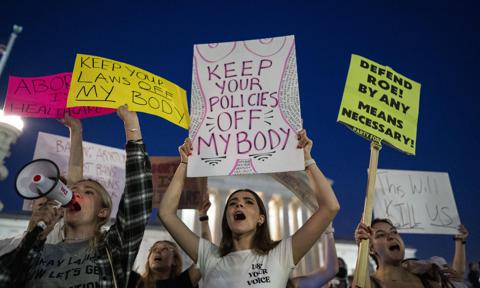
It’s very likely that you would have come across the term ‘Roe v. Wade’ at least more than a couple of times during the past few days on the Internet. In a scary The Handmaid’s Tale-esque turn of events, a leaked document from the Supreme Court of the United States has revealed that it’s planning to overturn the constitutional precedent that could potentially take away the reproductive rights of millions of American women. In the landmark case, the Supreme Court passed a ruling that access to legal abortion is a constitutional right of every woman. With a possibility of this being overturned, there’s a pretty solid chance that legal abortions could soon become inaccessible to a majority of American women.
Here’s everything you need to know about the landmark ruling and the effects of it being overturned on American society…
What is Roe v. Wade?
In a case put forth in 1970 by Jane Roe, the fictional alias of a Texas woman went up against Henry Wade, then the district attorney of Dallas County. Texas law at the time deemed abortion illegal except in instances where it would prevent a mother’s death. Roe’s lawyers argued such caveats were vague and unconstitutional, and that making abortion illegal infringed upon Roe’s right to privacy.
Justice Harry A. Blackmun delivered the majority opinion that the Court argued that making abortion broadly illegal violates the due process clause of the US Constitution’s Fourteenth Amendment, ensuring a citizen’s right to privacy. The clause reads that “no State shall...deprive any person of life, liberty, or property, without due process of law,” this ensured that the different states must respect the rights that are constitutionally afforded to every individual American woman.
Within the context of Roe v. Wade, a person’s bodily autonomy is considered part of their right to privacy, and the government regulating any person’s body is essentially unconstitutional. The Court stated that abortions should be treated differently at various points in a person’s pregnancy: In the first trimester, abortion may not be regulated by anyone besides a pregnant person and their doctor; in the second trimester, a state may regulate abortion if such a regulation is “reasonably related to maternal health.” Finally, in the third trimester, once a fetus is “viable”, or can survive outside the womb, states may regulate or prohibit abortion altogether, except in cases where the act is medically necessary to save a life.
What would overturning it mean?
If Roe V Wade is overturned, the authority to decide whether abortions are legal or not will fall to different states, instead of under a blanket law. Currently, abortion remains legal in every state though different states have imposed varying levels of restrictions. If the case is overturned then it would mean some states can outright declare abortion illegal without any legal consequences. It would also bring into question the legitimacy of the US Supreme Court and the stability of its precedences.
What are people saying about it?
Former presidential candidate Hillary Clinton expressed her thoughts about the decision in a series of Tweets, saying that it is “outrageous”.
Not surprising. But still outrageous.
— Hillary Clinton (@HillaryClinton) May 3, 2022
This decision is a direct assault on the dignity, rights, & lives of women, not to mention decades of settled law. It will kill and subjugate women even as a vast majority of Americans think abortion should be legal. What an utter disgrace. https://t.co/TNo1IX3Tl4
US Senator Elizabeth Warren also took to Twitter to call the Supreme Court “extremist” for imposing the unpopular views of the far-right on the country.
An extremist Supreme Court is poised to overturn #RoeVWade and impose its far-right, unpopular views on the entire country. It's time for the millions who support the Constitution and abortion rights to stand up and make their voices heard. We're not going back—not ever.
— Elizabeth Warren (@SenWarren) May 3, 2022
Congresswoman Alexandria Ocasio-Cortez voiced her outrage on Twitter, saying, “It’s time to be decisive, lead with confidence, fight for a prosperous future for all and protect the vulnerable. Leave it all on the field.”
People elected Democrats precisely so we could lead in perilous moments like these- to codify Roe, hold corruption accountable, & have a President who uses his legal authority to break through Congressional gridlock on items from student debt to climate.
— Alexandria Ocasio-Cortez (@AOC) May 3, 2022
It’s high time we do it.
Actress Jamila Jameel shared a photo of the late Supreme Court judge Ruth Bader Ginsburg along with the caption that talked about the toxic effects of patriarchy on women’s rights historically.
Actor Mark Ruffalo expressed his horror at the state of the country.
I can’t believe we are here. Book burning, bans on classroom discussions about race and sexuality, the erosion of voter’s rights aimed at the poor and people of color. It’s literally a right wing crack down on democratic norms. The worst are full of passionate intensity.
— Mark Ruffalo (@MarkRuffalo) May 3, 2022
Singer Phoebe Bridgers shared her own experience with getting an abortion and shared a list of resources that people can donate.
I had an abortion in October of last year while I was on tour. I went to planned parenthood where they gave me the abortion pill. It was easy. Everyone deserves that kind of access.
— traitor joe (@phoebe_bridgers) May 3, 2022
Here’s a big list of places you can donate to right now. https://t.co/jT0sk6CeNX
Actress and writer Lena Dunham took to Instagram to share a photo from an abortion rights protest along with a caption that stated her thoughts on the potential ruling.
- Quick links
- Roe V Wade

